Improve sleep quality and watch how it transforms your entire day. From boosting your mood to enhancing your focus, getting quality rest is the secret sauce to living a healthier, more productive life.
Yet, for many of us, consistently good sleep feels out of reach. Whether it’s stress, late-night screen time, or lifestyle habits, something is always standing in the way.
The good news? There are simple, effective changes you can make right now to start sleeping better tonight. Let’s dive into how to improve sleep quality and finally wake up feeling refreshed.
Why Sleep Quality Matters for Your Health?

Ensuring we get good quality sleep is crucial for maintaining our health. When we sleep well, our body repairs itself, our mind gets a chance to rest, and we wake up feeling ready to take on the day. Poor sleep quality can affect everything, from our mood to our immune system. In the long run, it can even lead to bigger health problems like:
- Heart disease
- Weight gain
- A weakened immune system
Good sleep helps keep our energy levels high and our brain sharp, which is why it’s something we should all prioritize in learning how to improve sleep quality.
Common Causes of Poor Sleep Quality
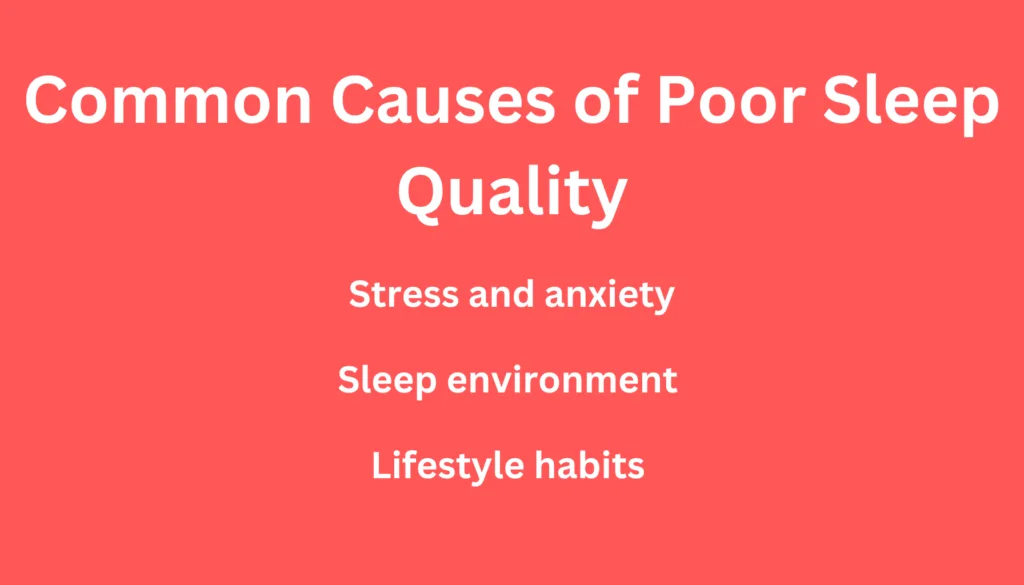
If you’re having trouble sleeping, you’re not alone. There are many common causes of poor sleep quality, and recognizing them is the first step to fixing the issue. Here are a few things that could be making it hard for you to sleep:
- Stress and anxiety: A racing mind can keep you awake.
- Sleep environment: Bright, noisy, or uncomfortable rooms disrupt sleep.
- Lifestyle habits: Too much caffeine, late-night eating, and screen time before bed can interfere with sleep.
Figuring out what’s causing your sleep issues can help you make changes to improve sleep quality.
Simple Lifestyle Changes to Improve Sleep Quality
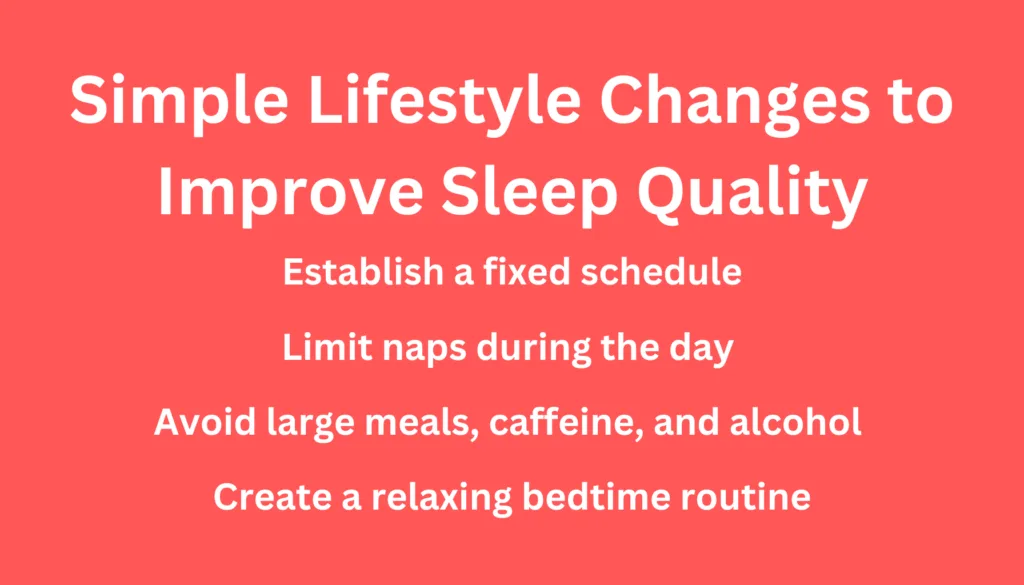
The good news is that small changes to your daily routine can make a big difference in sleep quality. Here are a few easy tweaks:
- Establish a fixed schedule: Going to bed and waking up—and maintain it daily, even on weekends.
- Limit naps during the day: If needed, keep naps short (20-30 minutes) and early in the afternoon.
- Avoid large meals, caffeine, and alcohol: These can disrupt your sleep.
- Create a relaxing bedtime routine: Try reading a book, listening to calming music, or taking a warm bath before bed.
These simple steps can go a long way toward improving your sleep quality.
Best Practices for a Consistent Sleep Routine and Improve Sleep Quality
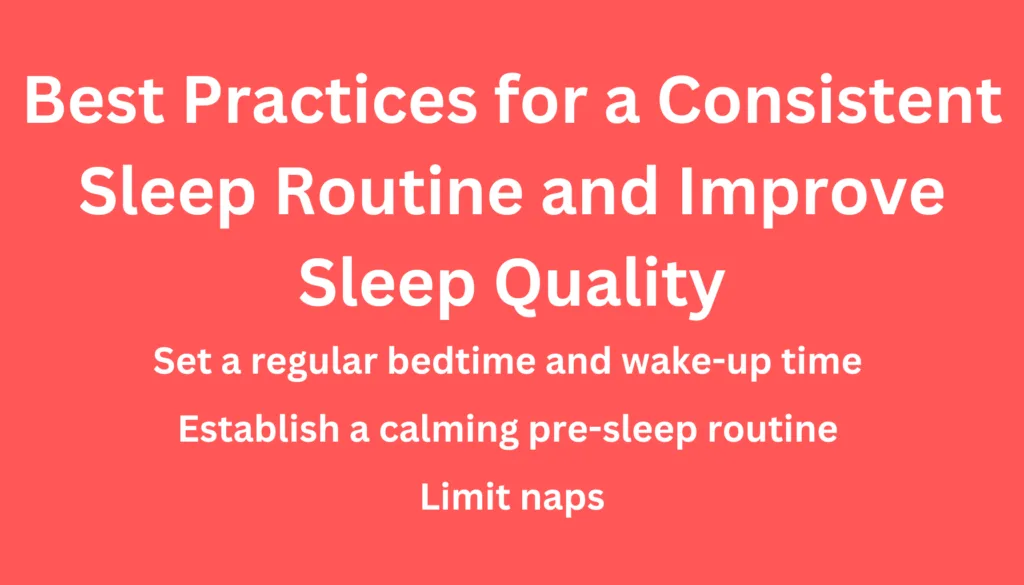
A consistent sleep routine is key to how to improve sleep quality. It’s all about developing habits that help your body know when it’s time to sleep and when it’s time to wake up. Here’s what you can do:
- Set a regular bedtime and wake-up time: Stick to it every day.
- Establish a calming pre-sleep routine: Dimming the lights, stretching, or deep breathing can help.
- Limit naps: Avoid naps late in the day or keep them short if you must.
It’s the regularity in your routine that helps train your body to sleep well.
How to Create a Sleep-Friendly Environment to Improve Sleep Quality

The quality of your sleep is greatly influenced by your bedroom environment. To improve your sleep quality, create a space that promotes rest:
- Block out light: Use blackout curtains or an eye mask to make the room dark.
- Minimize noise: Consider using earplugs or a white noise machine if needed.
- Keep the room cool: Aim for around 65°F (18°C), as cooler temperatures help with sleep.
- Invest in a comfortable bed: A supportive mattress and pillows that suit your preferences are essential.
Making these changes can help create a peaceful and comfortable environment that encourages sleep and enhances sleep quality.
credit:Dr. Daniel Fox
Natural Remedies for Improve Sleep Quality

If you prefer natural methods to improve your sleep, there are plenty of options to try. Here are some natural remedies that can aid:
- Herbal teas: Chamomile, lavender, and valerian root are known to promote relaxation.
- Aromatherapy: Essential oils like lavender and eucalyptus can create a calming atmosphere.
- Supplements: Melatonin is a popular natural sleep aid that helps regulate your sleep cycle.
- Relaxation techniques: Try deep breathing, progressive muscle relaxation, or mindfulness before bed.
These natural remedies can help calm your mind and body, making it easier to fall asleep.
The Impact of Stress and Anxiety on Sleep Quality

Stress and anxiety are two of the biggest enemies of good sleep. Here’s how they affect your body and hinder:
- Stress releases cortisol: This hormone keeps you alert and awake.
- Racing thoughts: Anxiety can make it hard to relax and fall asleep.
To combat this, try:
- Managing stress during the day: Activities like yoga, meditation, or journaling can help.
- Creating a relaxing bedtime routine: Listening to soothing music or practicing mindfulness can calm your mind before bed.
Managing your stress levels is key to improve sleep quality.
The Role of Diet and Exercise
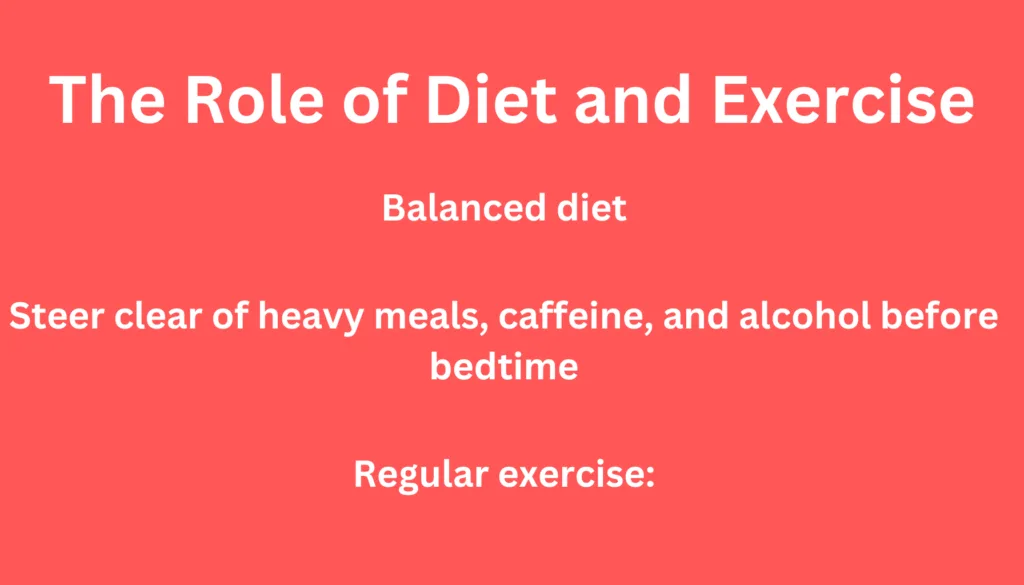
What you eat and how much you move during the day can impact the sleep quality at night. Keep these key points in mind:
- Balanced diet: Ensure your meals are rich in fruits, vegetables, and whole grains.
- Steer clear of heavy meals, caffeine, and alcohol before bedtime: As these can disrupt your sleep.
- Regular exercise: Physical activity during the day can improve sleep quality, but try to avoid working out too close to bedtime.
A healthy diet and regular physical activity are key components of improve sleep quality.
How Technology Affects Your Sleep Patterns

Our phones, tablets, and TVs might be keeping us awake longer than we think, which impacts how to improve sleep quality. Here’s how technology affects sleep:
- Blue light: The light from screens can interfere with melatonin production, making it harder to fall asleep.
- Active mind: Watching TV or scrolling through social media keeps your brain alert.
To improve your sleep, try:
- Limiting screen time before bed: Put away your devices at least an hour before you plan to sleep.
- Using night mode on devices: This reduces blue light exposure.
- Engaging in non-tech activities: Read a book, listen to music, or try another relaxing activity before bed.
These changes can help minimize the negative effects of technology and improve sleep quality.
When to Seek Professional Help?
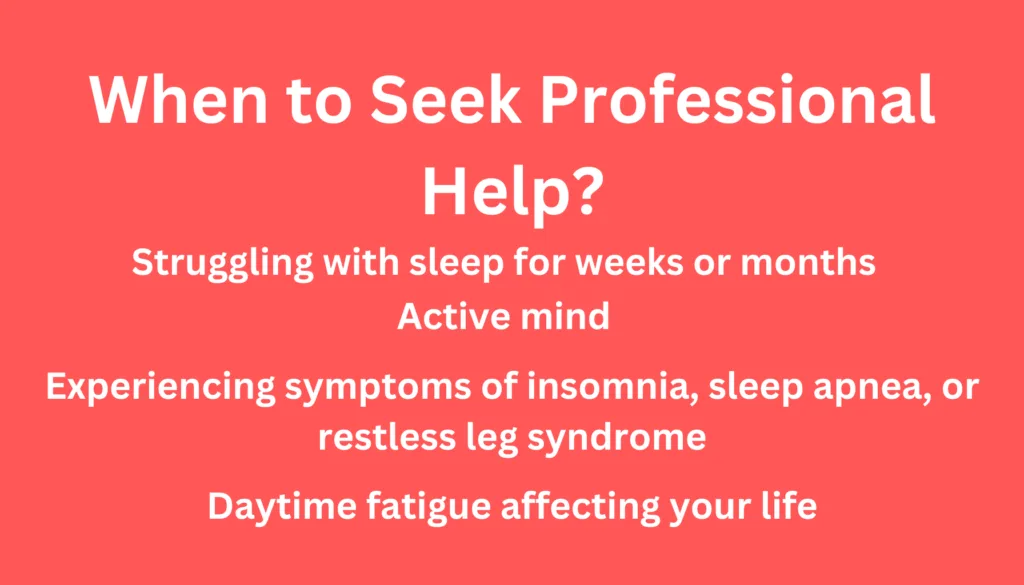
Sometimes, despite your best efforts on improve sleep quality may require professional help. Here are some signs it might be time to talk to a doctor:
- Struggling with sleep for weeks or months: Long-term sleep issues could point to a sleep disorder.
- Experiencing symptoms of insomnia, sleep apnea, or restless leg syndrome: These conditions are more common than you might think.
- Daytime fatigue affecting your life: If poor sleep is interfering with your daily routine, it’s time to seek help.
A healthcare professional can help diagnose the issue and recommend solutions, whether that’s through lifestyle changes, therapy, or medication.




